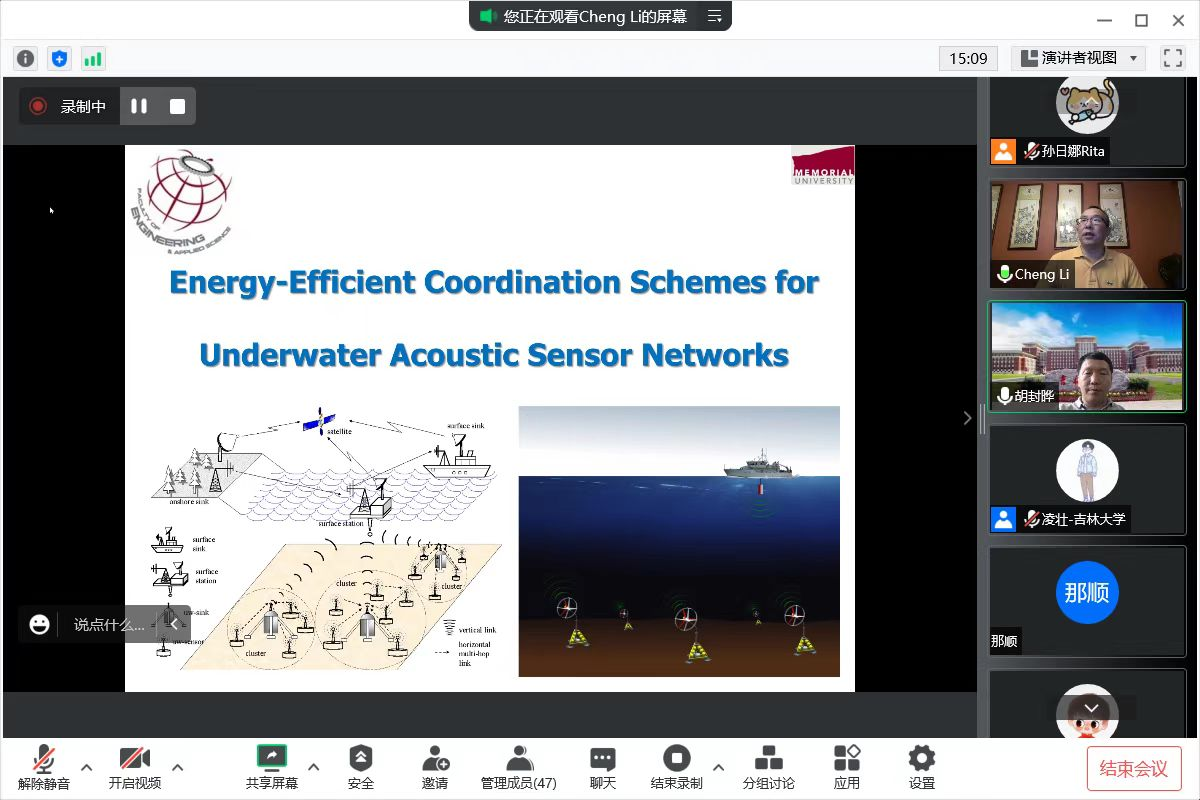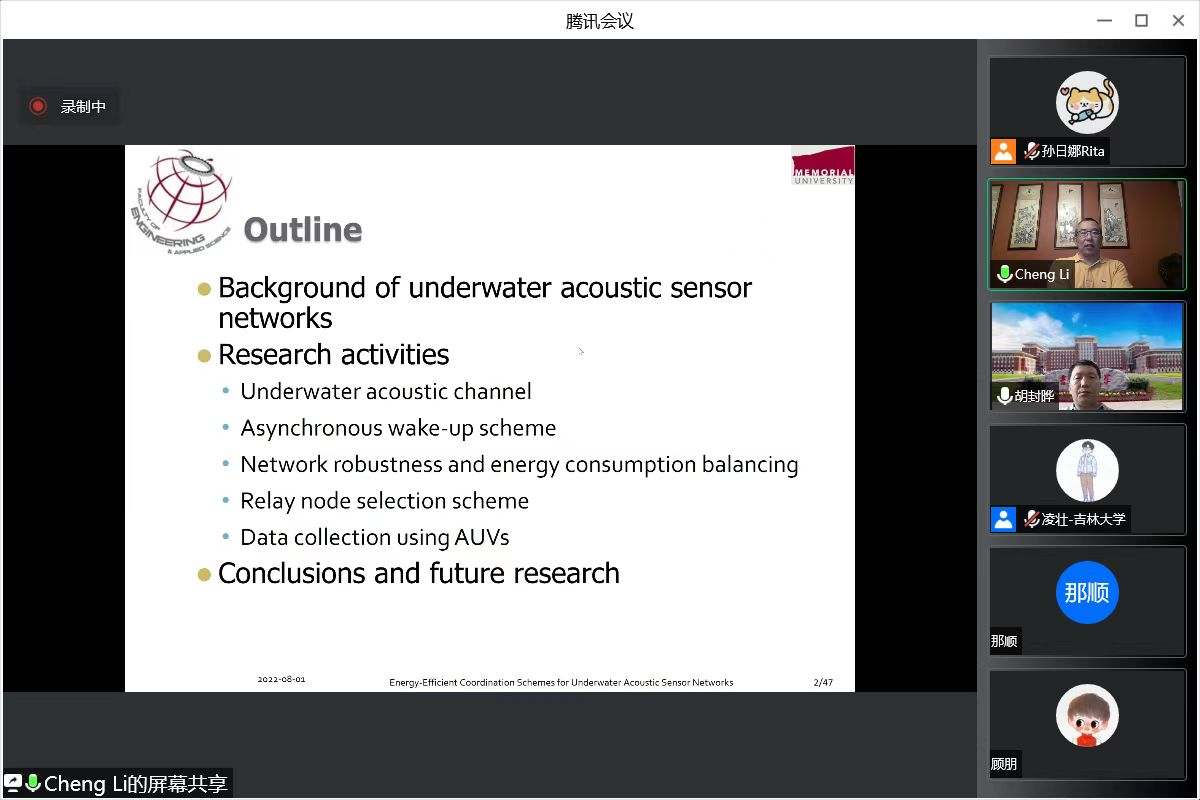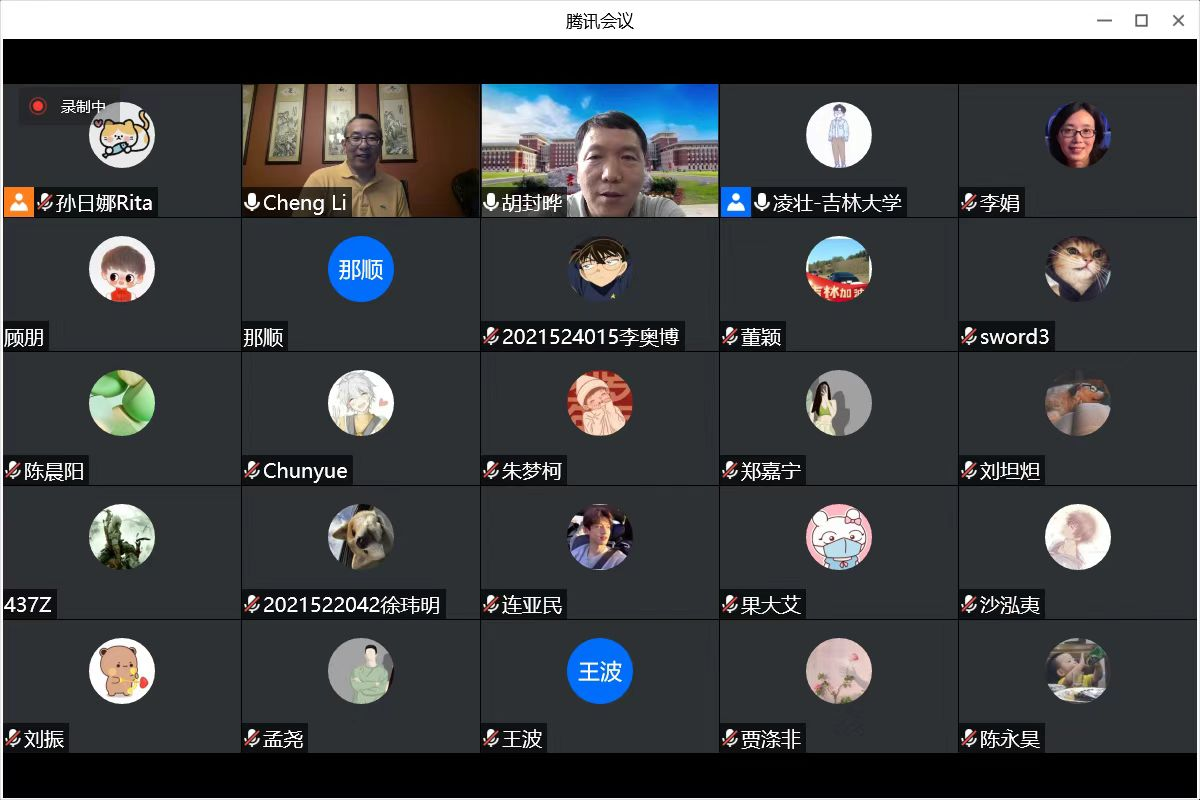At 9:00 on August 2nd, 2022, the third lecture of the lecture series on cutting-edge technologies in information communication and control was successfully held on Tencent platform. Professor Cheng Li, Head of the Department of Electrical and Computer Engineering at Memorial University, St. John’s, Canada, was invited to conduct an online academic exchange entitled “Energy-Efficient Coordination Schemes for Underwater Acoustics Networks” with teachers and students of the College of Communications Engineering. The exchange session was chaired by Professor Hu Fengye.

Before the speech started, Professor Cheng Li first introduced the construction, scenery, disciplines and faculty of the Memorial University of Newfoundland. He also shared with the participating teachers and students the local cultural scenery and daily life in Newfoundland.
Subsequently, Professor Cheng Li gave a report on the background of underwater acoustic sensor networks, five main research directions, and the prospect of future work. Firstly, he introduced the background of UWSNs networks, the topological structure of UWSN networks with AUV (Autonomous Underwater Vehicle), and the SEA formatics project developed by the team. He used a table to compare the performance differences of electromagnetic waves, light and underwater acoustic signals in water, showing that underwater acoustic communication is extremely challenging.
Professor Cheng Li then summarized the characteristics of underwater acoustic channels, such as spatiotemporal differences, large propagation delays, bandwidth limitations, and severe multipath effects. He also explained the design of two wake-up mechanisms and the simulation experimental results for our teachers and students. Aiming at the balance between robustness and energy consumption in UWSNs networks, the mathematical formula of network robustness is given. At the same time, the selection scheme of relay node to extend the life of the network is introduced. Finally, for the last aspect of this part, the collaborative scheme of using AUV for data collection, Professor Li concluded that the path planning of AUV has a key impact on the data acquisition and sleep duration of nodes.
Finally, Professor Li summarized the different research hotspots of underwater acoustic communication on energy consumption, as well as the prospects on underwater acoustic positioning tracking.
In response to the report, teachers and students of the College of Communications Engineering spoke enthusiastically, and asked Professor Cheng Li questions on various problems in practical operation, and received detailed answers and sharing. Finally, Professor Hu Fengye and Professor Li exchanged views on the hot topic of the current international development of the underwater Internet of Things.
This lecture, as the third in the lecture series on cutting-edge technologies in information communication and control, made full use of the advantages of digital platform for information exchange. It is based on our university and college, and is targeted at all teachers and students, so that they can have access to cutting-edge scientific and technological resources and discuss with the world’s leading experts without going abroad. Such an experience would inspire their scientific research and enrich their academic vision, thereby playing an active role in the development of of “Double First-Class” disciplines.


Attachment: Brief Introduction to Cheng Li
Cheng Li received his B. Eng. and M. Eng. degrees from Harbin Institute of Technology, Harbin, P. R. China, in 1992 and 1995, respectively, and his Ph.D. degree in Electrical and Computer Engineering from Memorial University, St. John’s, Canada, in 2004.
He is currently a Full Professor and Head of the Department of Electrical and Computer Engineering of Memorial University, St. John’s, Canada. His research interests include wireless communications and networking, communications signal processing, and mobile computing and computer networks. He has contributed 4 book chapters and over 350 research articles. He is an IEEE Communications Society Distinguished Lecturer for the 2021-22 term. He is an associate editor of the IEEE Transactions on Communications, the IEEE Internet-of-Things Journal, and the IEEE Network Magazine. He has served as the General Co-Chair of the ICNC’23, Q2SWinet’20, WINCOM’19, and AICON’19, and the TPC Co-Chair for the ICNC’20, ADHOCNETS’19, ACOSIS’19, WiCON’17, MSWiM’14, WiMob’11 and QBSC’10. He also served many times as a Technical Program Co-Chair for various technical symposia/tracks of international conferences, including the IEEE GLOBECOM, ICC, WCNC, and VTC. He served as the Chair of the IEEE Communications Society Ad Hoc and Sensor Networks Technical Committee (2018-19) and the Chair of the IEEE Newfoundland and Labrador Section (2012-13).
Dr. Li is the recipient of the Dean’s Award for Research Excellence at Memorial University in 2021, the recipient of the Technical Achievement Award of the IEEE Communications Society Communications Software Technical Committee in 2018, and the recipient of several Best Paper Awards at international conferences, including the IEEE Globecom’2017 and ICC’2010. He is a registered Professional Engineer (P.Eng.) in Canada and is a Senior Member of the IEEE and a member of the IEEE Communication Society, Computer Society, Vehicular Technology Society, and Ocean Engineering Society.